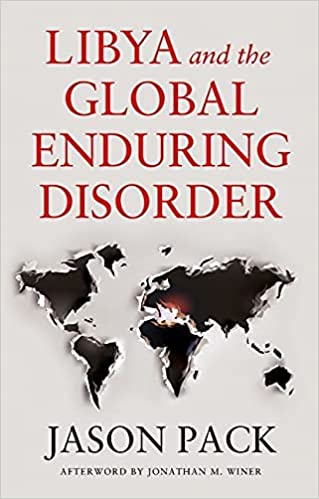 Two basic ideas dominate this book. The first is that the post-Cold War era has definitely ended and that we have now entered the era of “the global enduring disorder;” a claim fully confirmed by recent events in Ukraine. The second is that Libya, which most people see as a failed state made up of oceans of high-quality oil, vast stretches of pitiless desert, and bands of fanatical Toyota-truck riding gangsters that keep on fighting each other both acts as a microcosm of that disorder and is playing an important role in extending it
Two basic ideas dominate this book. The first is that the post-Cold War era has definitely ended and that we have now entered the era of “the global enduring disorder;” a claim fully confirmed by recent events in Ukraine. The second is that Libya, which most people see as a failed state made up of oceans of high-quality oil, vast stretches of pitiless desert, and bands of fanatical Toyota-truck riding gangsters that keep on fighting each other both acts as a microcosm of that disorder and is playing an important role in extending it
Let’s discuss the first idea first. The way the author sees it, those who, during the early 1990s, predicted the emergence of a warless globe presided over by a world government have been proved wrong. Far from waning away, wherever we look states remain the most important players of all. Still they do not have the playing field all to themselves. Far from it! In many places their authority is being undermined, nay nullified by more or less well organized, more or less fanatical, groups of terrorists, insurgents, guerrillas, or whatever they may call themselves or be called by others. Nor is that all. Many multinational corporations have entered the fray, looking after their own interests which may or may not coincide with those of the states in which they are officially registered. The states themselves do not act like those proverbial billiard balls but are represented by any number of competing, not seldom conflicting interests and agencies. Some states, organizations and officials remain the same for more or less extended periods. Others are like some kind of super-chameleons that keep changing not just their spots but their very essence. Welcome, to use a title of an article I published in the summer 2000 issue of Foreign Policy, “The New Middle Ages.”
Second, the role of Libya in all this. Here it is first of all necessary to say that Mr. Pack is that rarest of animals: an American who is not just an accomplished Arabist but actually likes many things Arab. Not an aspect of Arab language, dialects included, that he does not know inside out. Including religion, art, culture, tradition, history, and what not. Having lived in several Arab countries (and got into trouble with the authorities of at least one of them), he has met and conversed with many of the principal actors; the 297-page list of sources alone is enough to kill an ox, if only an ox could read it. For about a decade and a half now he has focused his efforts on Libya. Visiting the country, writing, lecturing, and advising every kind of individual and organization with an interest in oil, of whom there are a great many indeed. To say nothing of the problems created by the country’s critically important geographical position on the shores of the Mediterranean opposite Europe; its tendency to spew out emigrants in all direction; and many other issues.
Briefly, if there is anyone who can even begin to make some kind of sense of the way Libya is going, both internally and in respect to its infinitely complex relations with the rest of the world, it is Mr. Pack. As the title of his book indicates, on the whole his vision of the future is not optimistic. Unless something dramatic (“global collective action”?) is done, Libya is likely to remain in as much of a mess as it has been at least since the beginning of the by now half forgotten “Arab Renaissance” in 2011. Unless something dramatic is done, too, that mess is more likely to spread to other countries—particularly in Africa, the Middle East, and Southern Europe–than the other way around.
One final comment. Though part of the class known as academic literature, the book is well written. However, the vast panorama and superabundance of often obscure details means that it is by no means easy to read and, let alone assimilate. No more so than the works of Polybius, the Hellenistic historian whom Pack admires and quotes. Rather, doing so is a challenge; but for anyone interested in Libya and its relations with the rest of the world, it is also a must.
